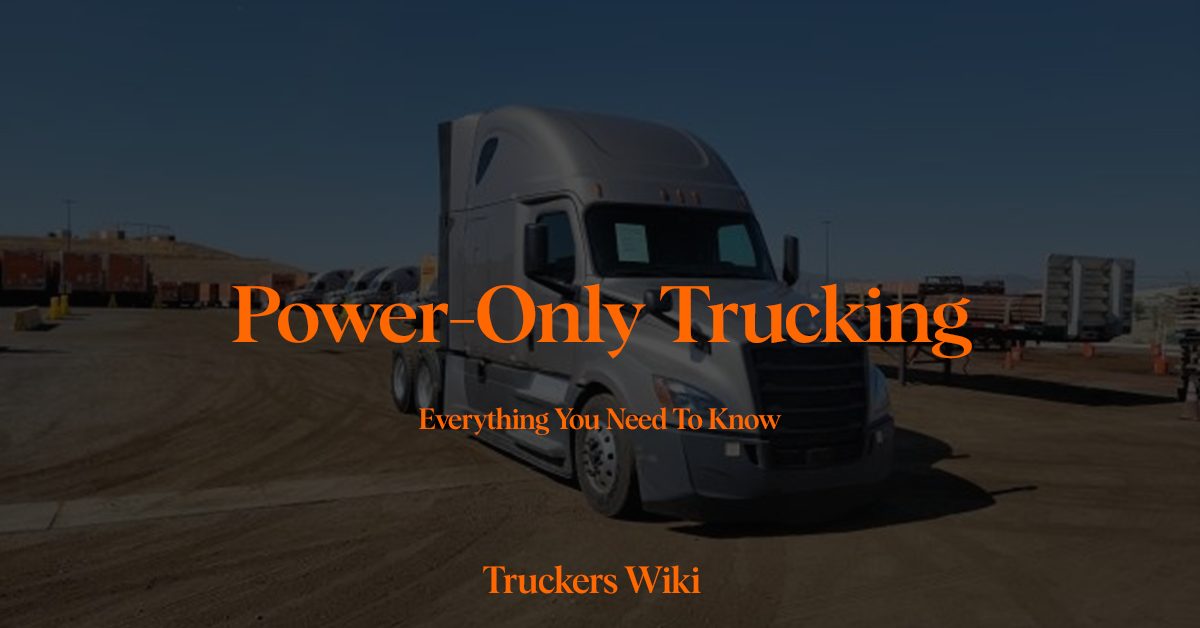
Table of Contents
What is Power-Only Trucking?
Power-only trucking is a specialized freight transportation model where carriers provide the tractor (power unit) while leaving the responsibility of the trailer to another party. Unlike traditional trucking, where carriers manage both the tractor and trailer, power-only trucking focuses solely on the driving force, making it a streamlined and efficient solution.
How Power-Only Trucking Works
In the realm of power-only trucking, collaboration takes center stage. Carriers team up with owner-operators or other carriers who possess the necessary trailers for the specific type of cargo. This synergy ensures that each component of the transportation process is optimized, from loading and hauling to unloading.
Benefits for Carriers:
- Cost-Effectiveness: Carriers can significantly reduce costs by focusing on their core competency – operating tractors. They eliminate the expenses associated with trailer ownership and maintenance.
- Versatility: Power-only trucking grants carriers the flexibility to work with various trailer types, allowing them to cater to a wide range of cargo needs.
- Reduced Deadhead Miles: With a dedicated focus on moving cargo, carriers can minimize empty return trips (deadhead miles), maximizing efficiency and profits.
Benefits for Owner-Operators:
- Income Opportunities: Owner-operators with trailers can capitalize on their assets by teaming up with carriers. This creates an additional revenue stream beyond driving.
- Lower Financial Risk: By entrusting the trailer to the carrier, owner-operators can mitigate the financial risks associated with trailer ownership and maintenance.
- Broader Reach: Owner-operators can tap into a broader network of carriers and industries, expanding their horizons and potential for earnings.
Advantages of Power-Only Trucking
Flexibility and Versatility
Power-only trucking thrives on its adaptability. Carriers can swiftly switch between different types of cargo by collaborating with owner-operators who have the appropriate trailers. This versatility enables carriers to explore diverse markets and capitalize on emerging opportunities.
Cost Efficiency
For carriers, power-only trucking translates into substantial cost savings. By shedding the financial burden of trailer ownership and maintenance, carriers can allocate resources more efficiently, focusing on optimizing their core operations.
Minimized Deadhead Miles
One of the standout advantages of power-only trucking is the minimization of deadhead miles. Carriers can consistently keep their tractors on the move, ensuring that every mile contributes to revenue generation.
Types of Equipment Used
Power-only trucking encompasses a spectrum of trailer types, including dry vans, flatbeds, reefers, and specialized trailers tailored to unique cargo requirements. This diversity underscores the adaptability of the power-only model, making it suitable for various industries and load types.
Check out the Rigs & Trailers category.
Power-Only vs. Traditional Trucking
Power-Only Trucking
- Focus: Primarily centers on providing the driving force (tractor).
- Efficiency: Minimizes costs by eliminating trailer ownership and maintenance.
- Flexibility: Adaptable to different trailer types and cargo.
- Deadhead Reduction: Significant reduction in deadhead miles.
Traditional Trucking
- Comprehensive: Involves owning and maintaining both tractors and trailers.
- Costs: Higher expenses due to trailer ownership and upkeep.
- Specialization: Tailored to specific trailer types and cargo.
- Deadhead Challenge: Deadhead miles can impact overall profitability.
Challenges and Considerations
While power-only trucking presents numerous advantages, it’s not without its challenges. Effective load sourcing, building strong customer relationships, and ensuring compliance with regulations are crucial aspects for success in this model.
Load Sourcing
- Establishing a robust network of carriers and owner-operators with suitable trailers is essential for consistent work opportunities.
Learn about Power-Only loads here.
Customer Relationships
- Maintaining transparent and efficient communication with shippers and brokers is vital for securing and retaining business.
Compliance and Safety
- Adhering to regulations and safety standards remains paramount. Carriers and owner-operators must ensure that trailers are properly maintained and compliant.
Success Stories
Numerous companies and owner-operators have harnessed the power-only model to drive success:
- Carrier Collaboration: Carriers have successfully expanded their reach by collaborating with diverse owner-operators, enabling seamless cross-country operations.
- Owner-Operator Empowerment: Owner-operators have experienced increased earnings by leveraging their trailers and forming partnerships with carriers.
Learn about Owner-Operators here.
Learn about the Types of Trailers used in trucking here.
Insight into power-only trucking, article by GoMotive.

